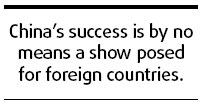China has reasons to trust its own models
For a long time, the five-star red flag would always be shown along with critical opinions about China on many US television programs. But this has changed in the days around the Beijing Olympics. Now it seems that the Chinese national flag, together with the Tian'anmen Square, the Summer Palace, the Great Wall, and especially the Bird's Nest and the Water Cube, has become the symbol of a "New China".
Is it true that the West has already had a positive change of attitudes to China? In fact, the long-standing image of China as the "Sick man of East Asia" that the West fostered in history was broken more than 20 years ago when Chinese athletes snatched 15 gold medals in the Los Angeles Olympics, pushing it into the world camp of sports powers.
However, a sense of intrinsic superiority about its civilization still prevails in the Western world. The essence of their reluctance to see China play a crucial role in international politics or take it as an equal partner still remains, although Western countries have changed their deep-rooted mindset about China a little after the end of the Beijing Olympics.
After the Beijing Games a large number of foreigners may now believe that China should stick to its own development model and that it is unviable to govern such a big country with the Western political formula. However, we should not expect that only a sports event can fundamentally change their long-standing attitude toward China.

In a book in which he makes comparisons between the 1964 Tokyo Olympics, the 1988 Seoul Olympics and this year's Beijing Olympics, Victor Cha, former director for Asian Affairs in the White House's National Security Council, argues that the three Asian host countries had the same goal of greatly raising their international status through hosting the world's largest sport gathering. But in his opinion, such upgrading of their international status could be acquired only through making their policies lean to some extent toward the Western countries.
From the critical comments the West made about China on Olympics-related issues, we can conclude that some people in the West still regard the Olympics as their patent.
However, given its innate nature, the Western civilization cannot effectively stop warfare and strife among different countries. This is exactly what the West should learn from the Chinese civilization.
In his Ode to Sport, Pierre de Coubertin, the father of the modern Olympics, once praised the Olympics for its capacity to bring peace and promote happy relations between peoples.
The Beijing Olympics carried forward exactly this Olympic spirit, and at the same time, instilled into the Games the Chinese traditional spirit of "Great Harmony".
Quite a few Asian media outlets contended that the Beijing Olympics is a sports competition between Asian countries on one side and European and American countries on the other, or between the East and the West.
Europe is the birthplace of the modern Olympics, and a number of competitive items in the Games were also invented by America and the European countries as their athletes possessed an obvious advantage in these. But table tennis and badminton are exceptions. Despite being invented in Europe, the two games are now dominated largely by Asian athletes. More interesting, hardly had a US magazine published an article deriding the bad performances of India in the Olympics, when the South Asian country's contender Abhinav Bindra clinched for his country the first individual medal in the Olympics, by winning 10m air rifle event at the Beijing Games. This is the real charm of the Olympics in which no country or individual can claim to be the winner forever. It is also an event from which people from different nations can share great excitement and joy from an excellent performance by any participant.
The great success of the Beijing Olympics lies in China's presentation to the world a different Olympics that blended its traditional cultural elements with delicate services in the Games. The success tells us that in our development and integration to the international community, we should not excessively worship or blindly exclude something alien. People's Olympics is the one to disseminate China's excellent culture and also absorb excellent foreign cultures. The Beijing Olympics is an example of the best combination of Chinese and foreign cultures.
The Games also tells us that, in dealing with other countries, we should never use the ever-growing clout of our culture as a soft force to bully less powerful countries. As a developing nation still plagued by a raft of thorny domestic issues, we should listen, with a broader mind, to others' comments and learn to develop our national strength by making use of others' useful experiences.
China's success is by no means a show posed for foreign countries, but a reflection of tangible efforts to offer its 1.3 billion population an ever-improving living standard.
The author is a Chinese Indian living in Chicago, and the article is reprinted from Global Times
(China Daily 09/09/2008 page8)














